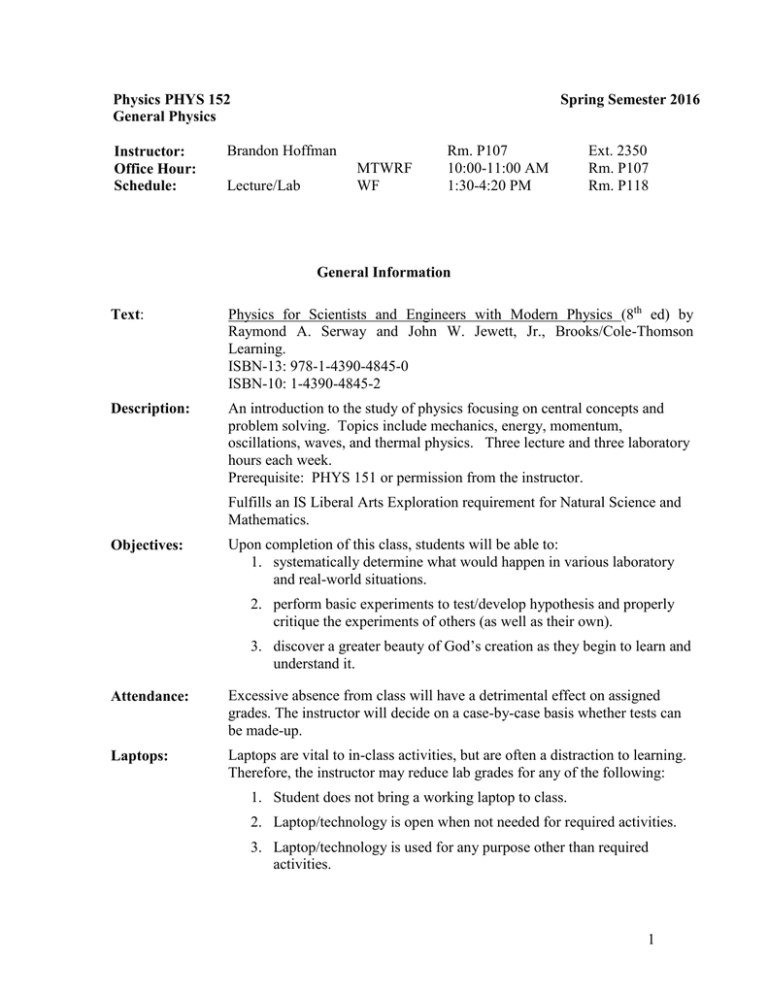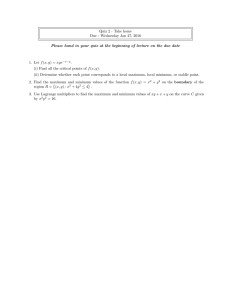Brandon Hoffman Rm. P107 Ext. 2350
advertisement

Physics PHYS 152 General Physics Instructor: Office Hour: Schedule: Spring Semester 2016 Brandon Hoffman Lecture/Lab MTWRF WF Rm. P107 10:00-11:00 AM 1:30-4:20 PM Ext. 2350 Rm. P107 Rm. P118 General Information Text: Physics for Scientists and Engineers with Modern Physics (8th ed) by Raymond A. Serway and John W. Jewett, Jr., Brooks/Cole-Thomson Learning. ISBN-13: 978-1-4390-4845-0 ISBN-10: 1-4390-4845-2 Description: An introduction to the study of physics focusing on central concepts and problem solving. Topics include mechanics, energy, momentum, oscillations, waves, and thermal physics. Three lecture and three laboratory hours each week. Prerequisite: PHYS 151 or permission from the instructor. Fulfills an IS Liberal Arts Exploration requirement for Natural Science and Mathematics. Objectives: Upon completion of this class, students will be able to: 1. systematically determine what would happen in various laboratory and real-world situations. 2. perform basic experiments to test/develop hypothesis and properly critique the experiments of others (as well as their own). 3. discover a greater beauty of God’s creation as they begin to learn and understand it. Attendance: Excessive absence from class will have a detrimental effect on assigned grades. The instructor will decide on a case-by-case basis whether tests can be made-up. Laptops: Laptops are vital to in-class activities, but are often a distraction to learning. Therefore, the instructor may reduce lab grades for any of the following: 1. Student does not bring a working laptop to class. 2. Laptop/technology is open when not needed for required activities. 3. Laptop/technology is used for any purpose other than required activities. 1 Homework: Problem sets are to be turned in before each lecture period. Late homework will not be accepted. I will be very particular about the format of the homework. Sloppy or disorganized work will not be accepted. I will expect the rules shown below to be followed, as described in the handout: 1. 2. 3. 4. 5. 6. 7. Use only one side of your paper. Begin each problem with a pictorial description. Always include diagrams when applicable. Begin every major step in the solution with a description of that step. Include units for every number written. Leave space - do not crowd your work into a tiny area on the page. Box your final answer. Note: You are welcome to ask classmates, TA’s, or the professor for help on your homework. However, online help will be considered cheating. Homework will typically be returned within about 2 work days. You are expected to review all corrections carefully and promptly. Reading: You will be expected to keep up with the assigned textbook reading from the course syllabus. Quizzes: There will be eight 15-minute quizzes on the dates given below (dates subject to change). There will also be a comprehensive final exam. (An equation sheet will be given for the final.) Make-up examinations will be given only in very unusual circumstances. Test Date Chapters Covered* Friday, January 29 19 – 20 Quiz 1 Wednesday, February 10 21 – 22 Quiz 2 Wednesday, March 2 Quiz 3 23, 25 Friday, March 11 Quiz 4 26 – 27 Friday, March 18 Quiz 5 28 Friday, April 8 Quiz 6 29 – 30 Friday, April 22 Quiz 7 31 – 32 Wednesday, May 4 Quiz 8 34 – 35 Friday, May 6 Final 19 – 36 *Note: only the sections indicated in the syllabus will be tested. Final Exam: The final examination will be comprehensive. No deviations from the college stated time for the final examination will be allowed, except for dire emergencies. Travel arrangements and weddings do not qualify as dire emergencies. 2 Grades: A grading rubric for activities in this course can be found on the following website: http://www.houghton.edu/physics/physics-grading-rubric/ The final grade will represent a weighted average of the scores as shown below. Assignment Percent of grade Homework Eight Unit Quizzes (4% each) Final Examination Laboratory TOTAL 28% 32% 15% 25% 100% Letter grades will be assigned as follows: Percent 90-100 87-89 84-86 80-83 77-79 74-76 Grade A AB+ Percent 70-73 67-69 64-66 Grade C CD+ B 60-63 D B- 57-59 D- C+ 0-56 F Typical minimum time expected for various activities in this course: Learning activity Lecture/lab class time Assigned reading Homework Study for in-class exams Total Time Additional comments Includes lab activities and written work Textbook reading without quizzes For major courses Typical minimum time Typical minimum on task time for the course 160 minutes per class 4640 minutes 5 minutes per page 1900 minutes 10 hours per problem set 5 hours per exam 8400 minutes1 1200 minutes2 269 hours 1. Each semiweekly set is considered to be one half of a standard physics problem set. 2. Each unit quiz is considered to be one half of a typical physics exam. 3 1. Wednesday, Jan. 13 2. Friday, Jan. 15 3. Wednesday, Jan. 20 4. Friday, Jan. 22 5. Wednesday, Jan. 27 6. Friday, Jan. 29 7. Wednesday, Feb. 3 8. Friday, Feb. 5 9. Wednesday, Feb. 10 10. Friday, Feb. 12 11. Wednesday, Feb. 17 12. Friday, Feb. 19 Wednesday, Feb. 24 Friday, Feb. 26 13. Wednesday, Mar. 2 Lecture Schedule Lecture Topic: Temperature Sections: 19.1 – 19.5 Lab: Ideal Gas law and Measuring Absolute Zero; Thermal Expansion of Water Lecture Topic: Heat and Internal Energy Sections: 20.1 – 20.4 Lab: Specific Heats of Metals; Latent Heat of Fusion; Lecture Topic: Thermodynamic Processes Sections: 20.4 – 20.7 Lab: Equivalence of Mechanical & Thermal Energy Lecture Topic: Kinetic Theory of Gases Sections: 21.1 – 21.4 Work Done by N2/Air Lecture Topic: Heat Engines and the Second Law Sections: 22.1 – 22.3 Quiz 1: CH 19-20 Lecture Topic: Heat Engines and the Second Law Sections: 22.4 – 22.5 Lecture Topic: Electric Fields Sections: 23.1 – 23.3 Lab: Electroscope Lab Lecture Topic: Electric Fields Sections: 23.4 – 23.7 Lab: Coulomb’s Law with Pendulum Quiz 2: CH 21-22 Lecture Topic: Electric Potential Sections: 25.1 – 25.3 Electric Fields and Equipotentials Lecture Topic: Electric Potential Sections: 25.4 – 25.6 Lecture Topic: Capacitance and Dielectrics Sections: 26.1 – 26.4 Lab: Capacitors Lecture Topic: Capacitance and Dielectrics Sections: 26.5 Lab: Homemade Capacitors with Dielectrics February Break Quiz 3: Lecture Topic: Sections: Lab: CH 23, 25 Current and Resistance 27.1 – 27.6, 28.2 Resistance 4 14. Friday, Mar. 4 15. Wednesday, Mar. 9 16. Friday, Mar. 11 17. Wednesday, Mar. 16 18. Friday, Mar. 18 Wednesday, Mar. 23 Friday, Mar. 25 19. Wednesday, Mar. 30 20. Friday, Apr. 1 21. Wednesday, Apr. 6 22. Friday, Apr. 8 23. Wednesday, Apr. 13 24. Friday, Apr. 15 25. Wednesday, Apr. 20 26. Friday, Apr. 22 Lecture Topic: Sections: Lab: Lecture Topic: Sections: Lab: Quiz 4: Lecture Topic: Sections: Lab: Lecture Topic: Sections: Lab: Quiz 5: Lecture Topic: Sections: Lab: Direct Current Circuits 28.1 – 28.3 Intro to Electric Circuits Direct Current Circuits (Cont.) 28.1 – 28.4 RC Circuits CH 26-27 Magnetic Fields 29.1 – 29.2, 30.6 Permanent Magnets Magnetic Fields and Moving Charges 29.3 – 29.4 Homemade Speaker CH 28 Sources of Magnetic Fields 30.1 – 30.2 Homemade Motor/Generator Easter Break Lecture Topic: Sections: Lab: Lecture Topic: Sections: Lab: Lecture Topic: Sections: Lab: Quiz 6: Lecture Topic: Sections: Lab Lecture Topic: Sections: Lab Lecture Topic: Sections: Lab: Lecture Topic: Sections: Lab: Quiz 7: Lecture Topic: Sections: Lab: Sources of the Magnetic Field 30.3 – 30.4 Magnetic Field in a Slinky Faraday’s Law 30.5, 31.1 – 31.3 Inducing a Voltage Faraday’s Law 31.4 – 31.6 Rail gun CH 29-30 Self-Inductance 32.1 – 32.3 Self-Inductance Mutual Inductance 32.4 – 32.5 Mutual Inductance and Transformers Electromagnetic Waves 34.1 – 34.6 Light and Distance (2007) Light and Laws of Optics 35.1 – 35.5 Reflection and Refraction CH 31-32 Light and Laws of Optics 35.6 – 35.8 Prisms 5 27. Wednesday, Apr. 27 28. Friday, Apr. 29 29. Wednesday, May 4 30. Friday, May 6 Lecture Topic: Sections: Lab: Lecture Topic: Sections: Lab: Quiz 8: Lecture Topic: Sections: Lab: Comprehensive Final Image Formation 36.1 – 36.2 Mirrors Image Formation 36.3 – 36.4 Thin Lenses CH 34-35 Wave Optics 37.1 – 38.5 Young’s Double Slit Single slit (hole) diffraction 4:00-6:00pm 6
